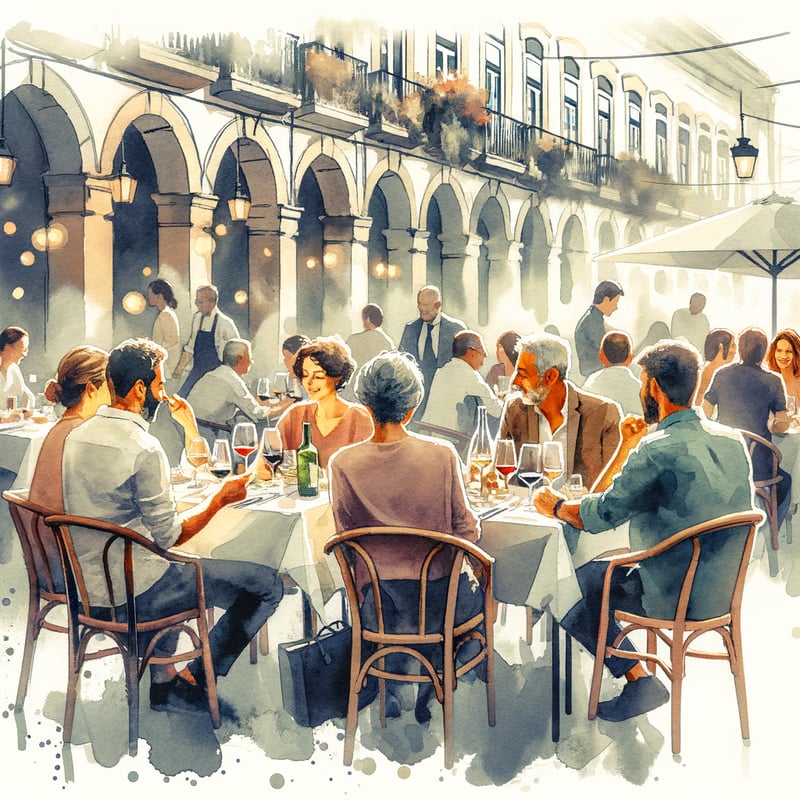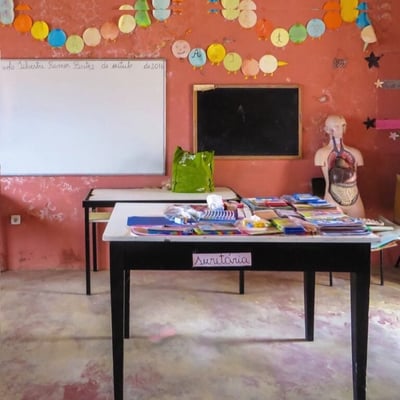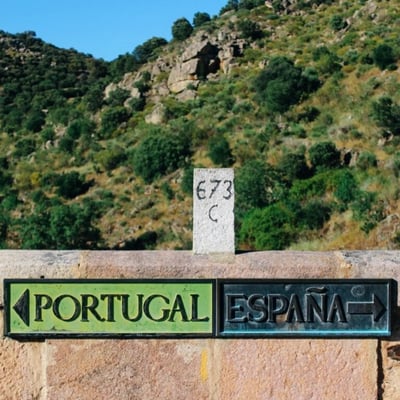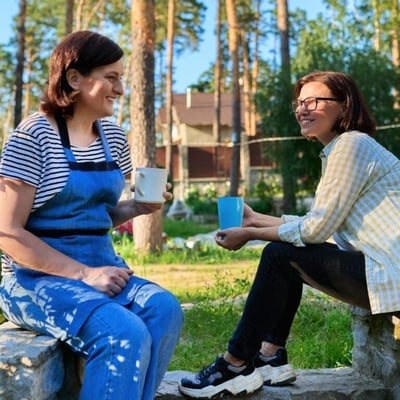1
00:00:03,216 –> 00:00:05,626
André: Ontem tivemos muita sorte!
{{André: Yesterday we were very lucky!}}
2
00:00:06,086 –> 00:00:10,808
Sofia: Pois foi. Nunca pensei que nos arranjassem uma mesa para 6 pessoas àquela hora.
{{Sofia: We sure were. I never thought we would get a table for 6 people at that hour.}}
3
00:00:11,376 –> 00:00:16,111
André: Pois, também não estava à espera que o Pedro e a Bárbara viessem ter connosco.
{{André: Well, I didn’t expect Pedro and Bárbara to come join us either.}}
4
00:00:16,576 –> 00:00:20,070
Sofia: Mas ainda bem que vieram. Estava com imensas saudades deles!
{{Sofia: But I’m glad they came. I really missed them!}}
5
00:00:20,506 –> 00:00:22,627
André: E aonde é que foste depois do almoço?
{{André: And where did you go after lunch?}}
6
00:00:23,156 –> 00:00:28,849
Sofia: Fui passear com o Bernardo. Fizemos uma caminhada até à praia e, depois, estivemos lá à conversa.
{{Sofia: I went for a walk with Bernardo. We went for a walk to the beach and then we chatted there.}}
7
00:00:29,356 –> 00:00:30,616
André: Que bom!
{{André: How nice!}}
8
00:00:31,236 –> 00:00:35,663
Sofia: Foi muito agradável. Ele disse-me que está a pensar ir viver para fora.
{{Sofia: It was very nice. He told me he is thinking of moving abroad.}}
9
00:00:36,176 –> 00:00:36,901
André: A sério?
{{André: Really?}}
10
00:00:37,436 –> 00:00:41,262
Sofia: Sim. Ele tem um amigo a viver em Nova Iorque, que o convidou a ir para lá.
{{Sofia: Yes, he has a friend living in New York who has invited him to move there.}}
11
00:00:41,796 –> 00:00:44,415
André: Isso pode ser uma experiência incrível.
{{André: That could be an amazing experience.}}
12
00:00:44,906 –> 00:00:48,152
Sofia: Foi o que eu lhe disse. E tu, o que fizeste depois do almoço?
{{Sofia: That’s what I told him. And you, what did you do after lunch?}}
13
00:00:48,716 –> 00:00:53,401
André: Dei um passeio na baixa com a Carolina. Depois, fomos jantar a casa da irmã dela,
{{André: I took a walk downtown with Carolina. Then we went to her sister’s house for dinner,}}
14
00:00:53,496 –> 00:00:55,646
que fazia anos, e vimos um filme.
{{who had her birthday, and we watched a movie.}}
15
00:00:56,056 –> 00:00:56,730
Sofia: A Mafalda?
{{Sofia: Mafalda?}}
16
00:00:57,146 –> 00:00:57,616
André: Sim!
{{André: Yes!}}
17
00:00:58,146 –> 00:01:00,566
Sofia: Adoro-a! Ela é muito engraçada!
{{Sofia: I love her! She is very funny!}}
18
00:01:00,956 –> 00:01:04,016
André: Se é! Nós rimos muito ao jantar.
{{André: Yes she is! We laughed a lot at dinner.}}
19
00:01:04,526 –> 00:01:07,716
Sofia: Vou mandar-lhe uma mensagem. Não sabia que ela fazia anos…
{{Sofia: I will send her a message. I didn’t know it was her birthday…}}
20
00:01:08,206 –> 00:01:10,181
André: Eu não sabia que vocês se conheciam.
{{André: I didn’t know you knew each other.}}
21
00:01:10,656 –> 00:01:14,608
Sofia: Nós fizemos um curso de escrita juntas. Ficámos amigas desde então.
{{Sofia: We took a writing course together. We have been friends ever since.}}
22
00:01:15,066 –> 00:01:18,112
André: Que giro! Temos de combinar qualquer coisa os quatro.
{{André: How cool! The 4 of us have to arrange something (i.e. plan to do something together).}}
23
00:01:18,486 –> 00:01:20,996
Sofia: Sim, isso seria muito divertido.
{{Sofia: Yes, that would be very fun.}}
 We respect your privacy and have a ZERO TOLERANCE for spam.
We respect your privacy and have a ZERO TOLERANCE for spam.
















“Viessem ter” em A2?
There are 2 lines in which we use conjuntivo forms in this Shorty, which are typically considered above the A2 level. The CEFR ratings are just an estimate, as natural language usually falls across multiple levels at once. We felt that overall this dialogue fit better in A2, despite there being some elements of more advanced grammar. We’ll continue to gauge feedback on this, though!
At 1:00 André says “se é”? Or “sim é”? If he really says “se é”, what does that mean?
Olá 🙂 André does say “se é”. This is an idiomatic and emphatic way of confirming the previous idea. Like saying “Oh yes, she is!”
Can you please explain
Why the imperfect subjunctive is used in the sentence “Nunca pensei que nos arranjassem uma mesa”
The translation says “I never thought that we would get a table for 6 which doesnt seem be identical.´
It seems that a more correct translation would be “I never thought they might get/arrange us a table for 6 “.
Could the word conseguiríamos have been used as a replacement for nos arranjassem ?
Many thanks
Simon
In negative subordinate clauses, the verb ‘pensar’ generally asks for the subjunctive by default. The conditional (e.g. your proposed ‘conseguiríamos’) is seen occasionally, but not recommended in European Portuguese (it does seem more common in Brazilian Portuguese). So, if you would like to use an alternative wording, you could go for ‘conseguíssemos’.
– Nunca pensei que conseguíssemos uma mesa.
In any case, the current sentence & translation are sufficiently aligned in terms of the general idea that is expressed.